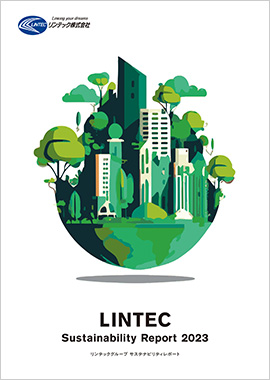- Small
- Large
Concept and Systems
- Concept of Sustainability and Long-term Vision
- Stories about Solving Social Issues
- Value Chain and Stakeholders
- Materiality and KPI
- Sustainability Promotion System
Concept of Sustainability and Long-term Vision
Many stakeholders support the business of the LINTEC Group. To meet their expectations and be trusted by them, all LINTEC Group employees actively conduct CSR activities centered on the company motto, “Sincerity and Creativity,” and in accordance with the “LINTEC WAY,” which is an important value supporting the company motto, the Basic CSR Approaches, and the LINTEC Group Compliance Guidelines.
Under the LINTEC SUSTAINABILITY VISION 2030 (LSV 2030), formulated as a vision toward the year ending March 2030, we established a system to promote initiatives related to ESG and SDGs, reviewed the Group’ s materiality issues, and set key performance indicators (KPI)★. We will contribute toward realizing a sustainability world by strengthening our corporate structure through innovation and creating new products and businesses for sustainable growth.
- ★Key performance indicators (KPI): KPI are important indicators related to organizational strategies, and quantitatively measure progress toward targets.
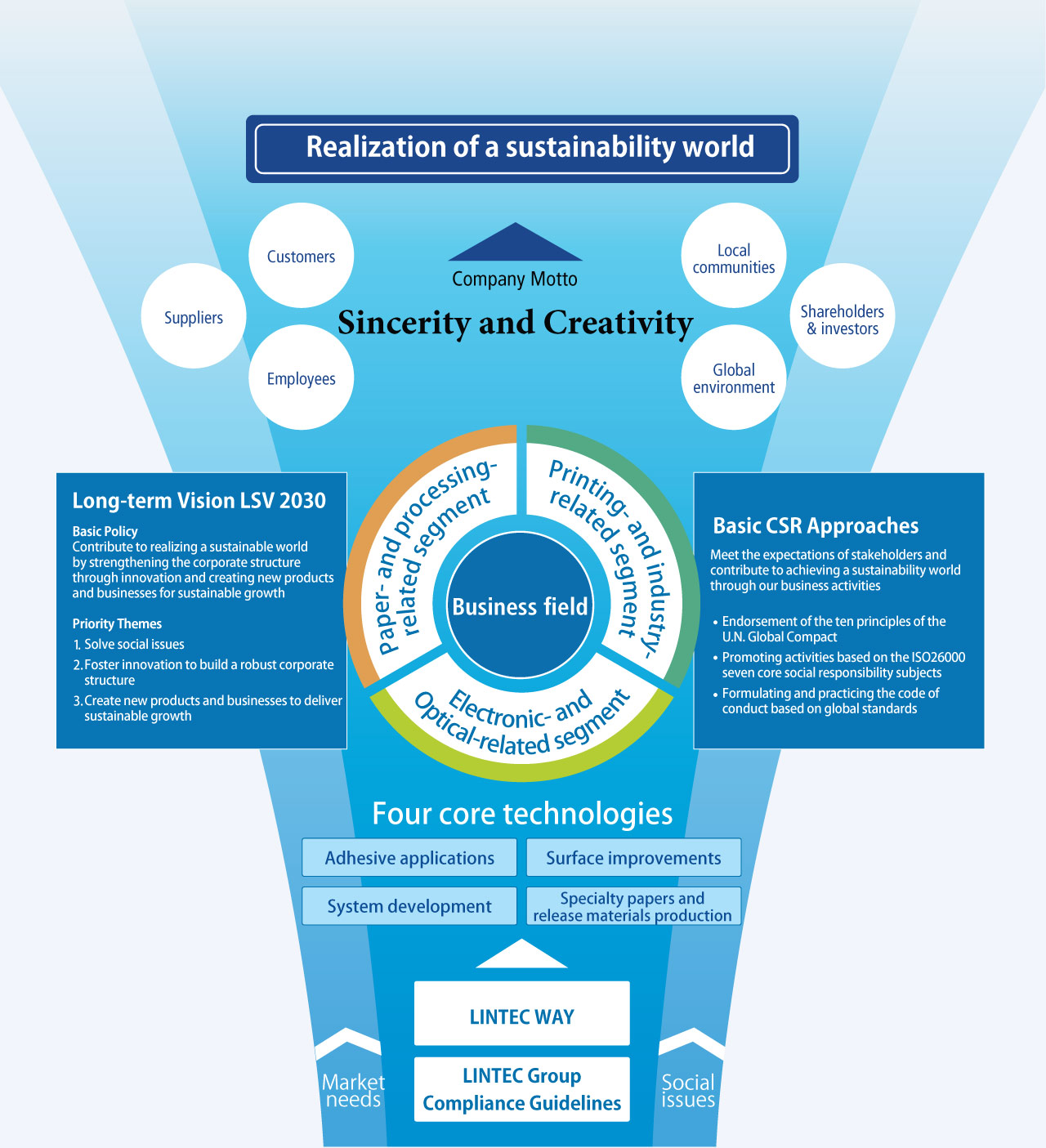
Participation in UN Global Compact
Having participated in the United Nations Global Compact since April 2011, the LINTEC Group conducts business activities based on the following Ten Principles to contribute to the sustainable growth of society.
Human Rights
Principle 1: Businesses should support and respect the protection of internationally proclaimed human rights; and
Principle 2: make sure that they are not complicit in human rights abuses.
Labour
Principle 3: Businesses should uphold the freedom of association and the effective recognition of the right to collective bargaining;
Principle 4: the elimination of all forms of forced and compulsory labour;
Principle 5: the effective abolition of child labour; and
Principle 6: the elimination of discrimination in respect of employment and occupation.
Environment
Principle 7: Businesses should support a precautionary approach to environmental challenges;
Principle 8: undertake initiatives to promote greater environmental responsibility; and
Principle 9: encourage the development and diffusion of environmentally friendly technologies.
Anti-Corruption
Principle 10: Businesses should work against corruption in all its forms, including extortion and bribery.
VOICE My Next Stage
The Global Compact Network Japan (GCNJ), which the LINTEC Group has participated in, is a global framework in which each company or organization acts as a good member of society by exercising responsible and creative leadership, to realize sustainable growth. GCNJ has 14 working groups engaging in various activities on human rights education, the environment, ESG, etc. under the initiative of member companies and organizations. The working groups offer opportunities for “open social innovation,” where corporate workers learn the practices of other companies and collaborate and communicate with others. From LINTEC, 14 people, including myself, are participating in various working groups. At the human rights education working group, we take a year to discuss a specific theme with members from other companies and prepare materials that are not only available for GCNJ members but non-members as well.
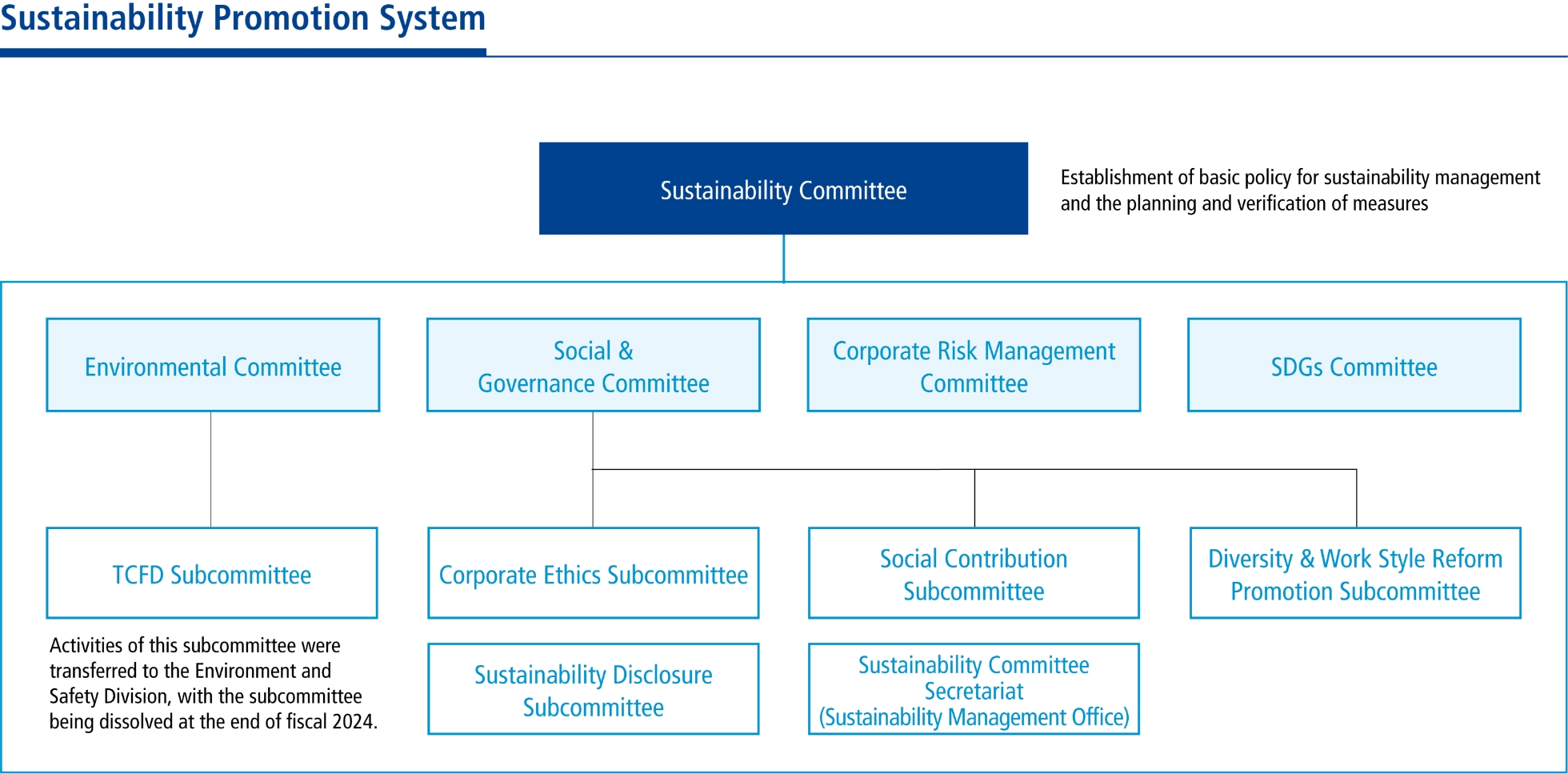
Corporate Strategic Office
ISO26000
ISO26000 is an international standard that defines the social responsibilities of all organizations. By referring to this, the LINTEC Group promotes CSR activities.
LINTEC Group Code of Conduct
The company motto, “Sincerity and Creativity,” is the primary principle of all officers and employees of the LINTEC Group, and the LINTEC Group Code of Conduct states the actions to be taken to realize the motto. We will act with high ethical standards and social norms in compliance with this code of conduct.
LINTEC Group’s Stories about Solving Social Issues
The LINTEC Group has identified its materiality (material issues) by connecting various social issues with the Group’s business activities and with its stakeholders, and has also set key performance indicators (KPI)★ for their assessment. The progress of our business activities is assessed at each stage and reviewed as necessary, taking into consideration changes in the social situation. By continuing this process, we will contribute to the realization of a sustainability world.
- ★Key performance indicators (KPI): KPI are important indicators related to organizational strategies, and quantitatively measure progress toward targets.
Slide to view.
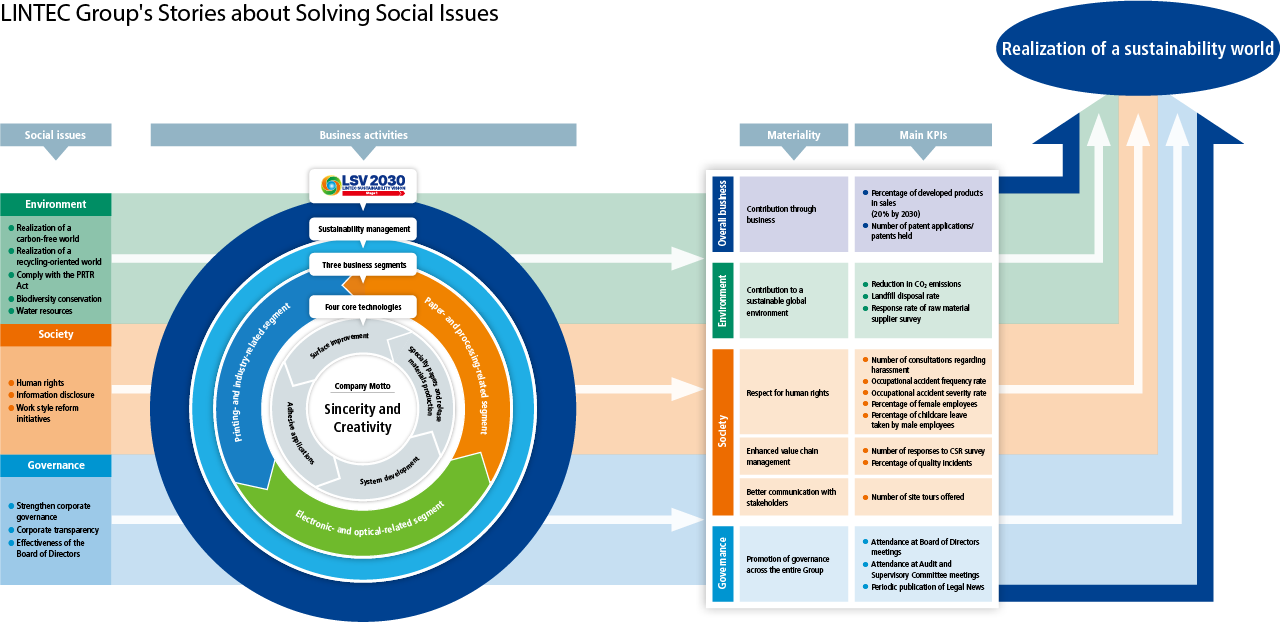
Value Chain and Stakeholders
LINTEC Group’s Value Chain and Stakeholders
The LINTEC Group sees the relationship of its value chain and stakeholders as shown below.
LINTEC Group’s Value Chain and Stakeholders
Slide to view.

- ★Modal shift: An initiative to reduce CO2 emissions by changing the mode of transport for passenger or cargo transportation from truck to railway or ship, allowing mass transport.
LINTEC Group’s Stakeholders
The LINTEC Group holds dialogue with its stakeholders at various opportunities and reflects their input in its business activities.
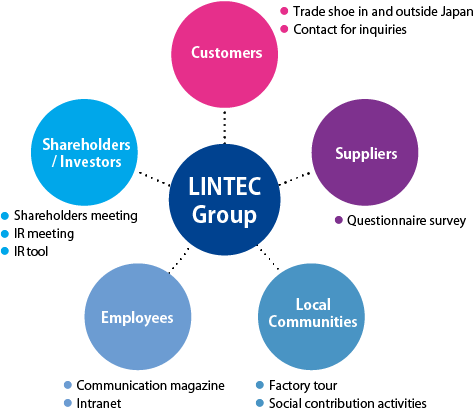
Materiality and KPI
The LINTEC Group identifies priority issues to be addressed in order to contribute to the realization of a sustainability world as materiality, and has also established key performance indicators (KPI)★ to check the progress of its efforts.
- ★Key performance indicators (KPI): KPI are important indicators related to organizational strategies, and quantitatively measure progress toward targets.
Materiality and KPI of the LINTEC Group
Slide to view.
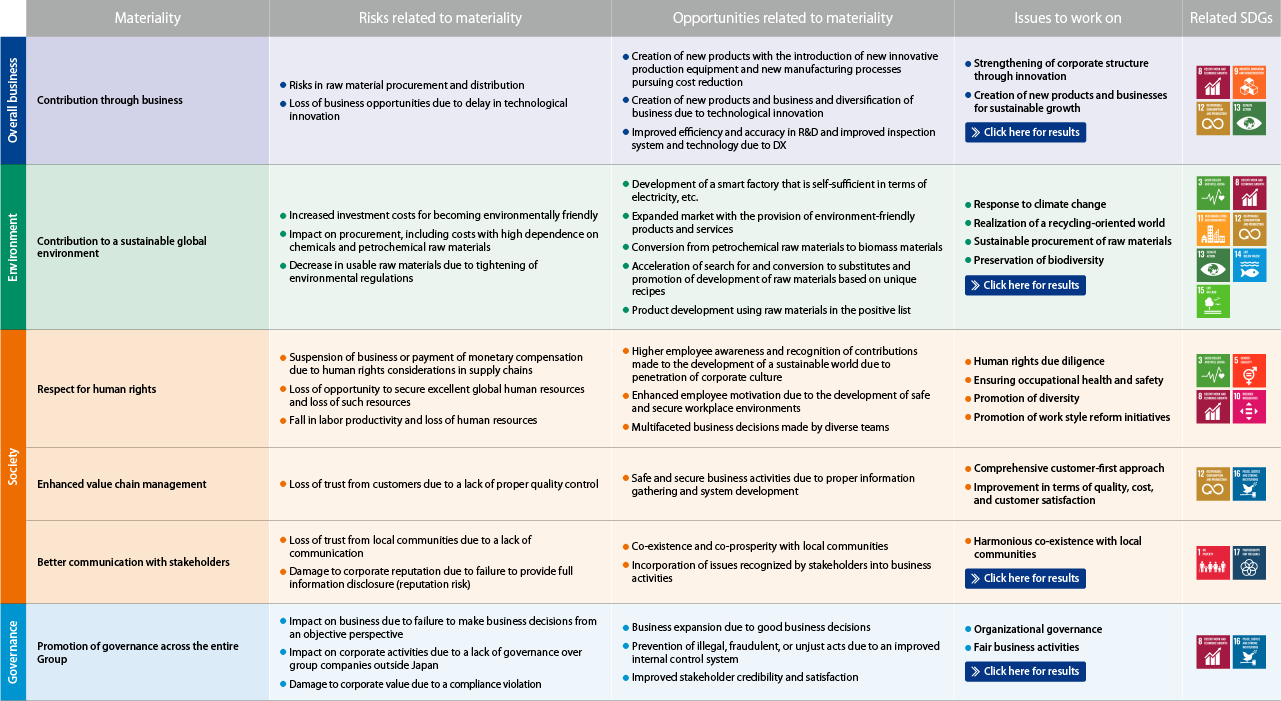
Materiality, KPI, results: Overall business
Slide to view.

Materiality, KPI, results: Environment
Slide to view.
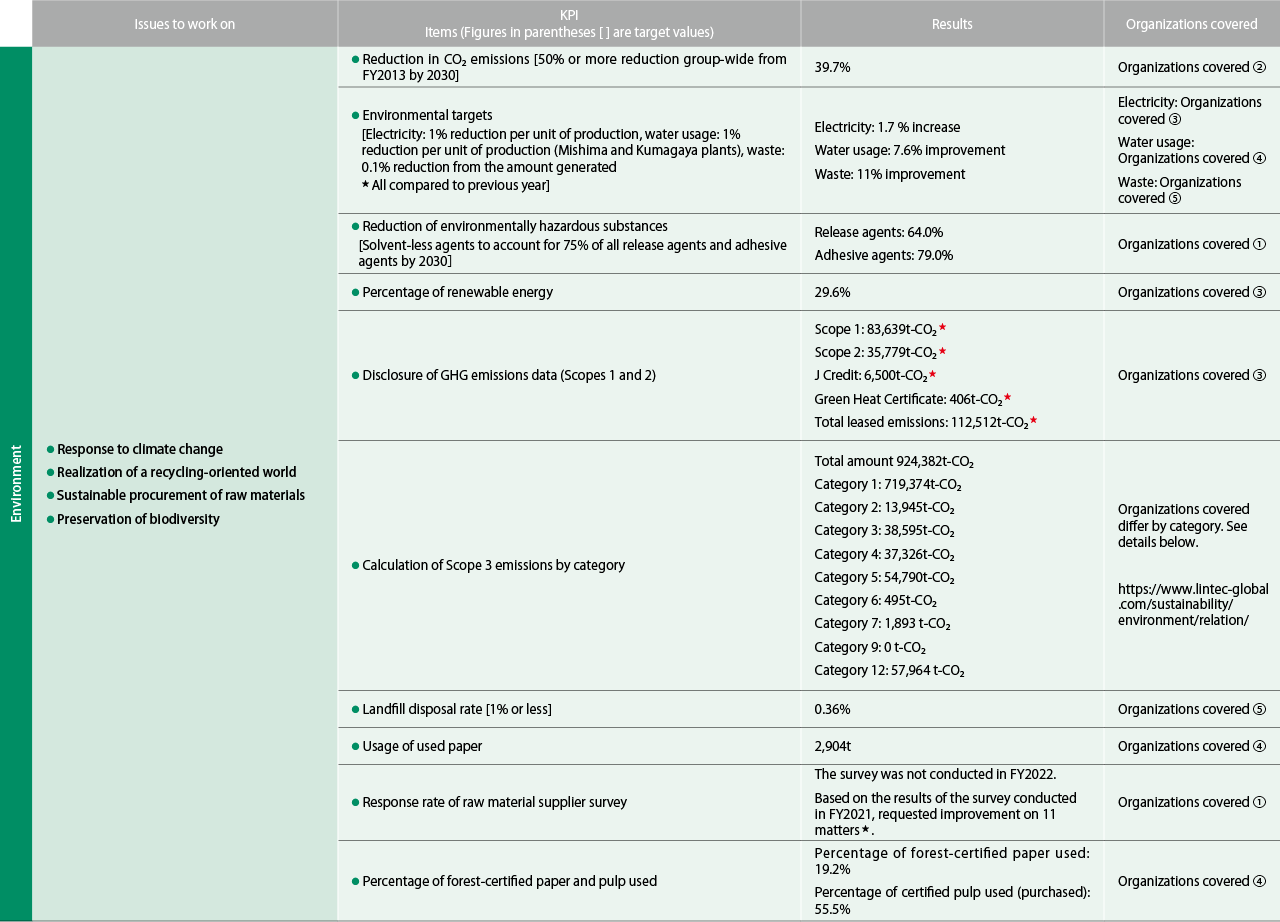
Materiality, KPI, results: Society
Slide to view.
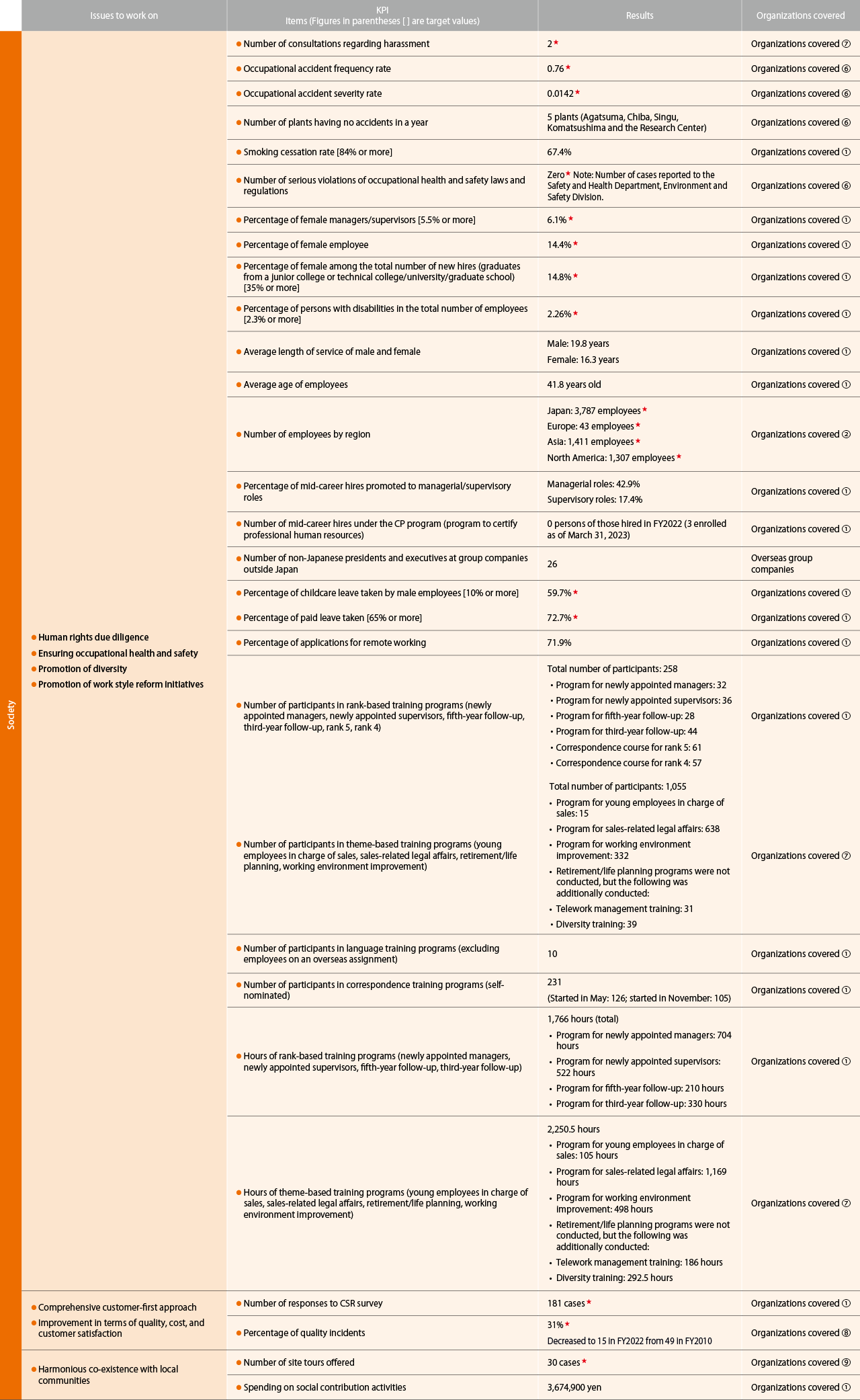
Materiality, KPI, results: Governance
Slide to view.

Organizations covered
①: LINTEC CORPORATION
②: The LINTEC Group, including LINTEC CORPORATION and its group companies in and outside Japan
③: LINTEC CORPORATION, TOKYO LINTEC KAKO, INC., SHONAN LINTEC KAKO, INC., LINTEC SERVICE, INC.
④: LINTEC CORPORATION’s Kumagaya Plant and Mishima Plant
⑤: LINTEC CORPORATION’s Head Office and 10 production sites (plants at Agatsuma, Kumagaya, Ina, Chiba, Tatsuno, Shingu, Niihama, Komatsushima, Mishima, and Doi), the Research Center, and TOKYO LINTEC KAKO, INC.
⑥: LINTEC CORPORATION’s 10 production sites (plants at Agatsuma, Kumagaya, Ina, Chiba, Tatsuno, Shingu, Niihama, Komatsushima, Mishima, and Doi), the Research Center, and TOKYO LINTEC KAKO, INC.
⑦: LINTEC CORPORATION and its group companies in Japan
⑧: LINTEC CORPORATION (excluding the Ina Technology Center), TOKYO LINTEC KAKO, INC., and SHONAN LINTEC KAKO, INC.
⑨: LINTEC CORPORATION and TOKYO LINTEC KAKO, INC.
Process of Reviewing Materiality
STEP 1
Analyze the value chain
We examined the value chain, as well as business activities and ESG★ themes of each division.
We also analyzed risks and opportunities with regard to ESG themes in the value chain.
STEP 2
Identify social demands
In addition to changes in international guidelines and frameworks, we have identified the key ESG themes of ESG assessment organizations and narrowed down our themes.
STEP 3
Identify internal importance
We looked into internal information, such as medium- to long-term strategies and business plans of each division and department formulated based on the long-term vision, LINTEC SUSTAINABILITY VISION 2030, and identified ESG themes that have a large impact on our business.
STEP 4
Identify material issues
We identified material issues by using a map that shows societal needs and internal importance and discussing areas that are relevant in deciding the importance.
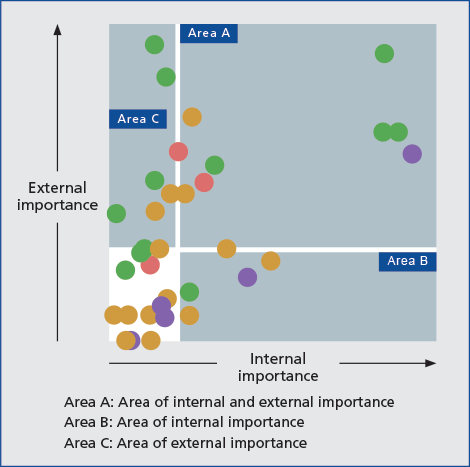
STEP 5
Set KPI
Based on the identified materiality, we set performance indicators for our activities and proceed with implementation.
Sustainability Promotion System
At the LINTEC Group, the company motto of “Sincerity and Creativity” is at the heart of all members and is the starting point of their activities to promote sustainability. To ensure successful implementation of these activities, we have established and reorganized committees and subcommittees. As of April 2023, there are five committees and five subcommittees.
Sustainability Committee
The Sustainability Committee developed a basic policy for sustainability management promotion, conducted a progress review and monitoring of measures taken by subordinate committees and subcommittees, and provided instructions for improvement. Additionally, it examined and approved identified and reviewed materiality issues for the achievement of LSV 2030 in response to information disclosure recommendations by the TCFD, and provided instructions for formulating a disclosure proposal.
In fiscal 2022, it held four meetings (April, July, October 2022 and January 2023), concurrently with online meetings with attendance of the 15 committee members reaching 100%.
Sustainability Disclosure Subcommittee
The Sustainability Disclosure Subcommittee made efforts for prompt and effective information disclosure to stakeholders as needed using disclosure materials, PR magazines, and websites, with a particular focus on further enhancing internal and external provision of information on sustainability management. In particular, in fiscal 2022, it held discussions for organizing information to be communicated in line with the new disclosure obligation on human capital, and promoted substantial review and examination of the method of communication of sustainability information and the contents of the integrated report for the next period. It also responded to surveys conducted by external evaluation organizations and ensured that top management was provided with feedback on evaluation results. In fiscal 2022, the subcommittee held three meetings and carried out activities through exchanging and sharing information between members as needed.
Comment by the officer in charge
In addition to disclosure of conventional financial information, society demands a broad range of non-financial information that can lead to future financial information. In communicating LINTEC’s business activities to society, the Sustainability Disclosure Subcommittee plays a key role in promoting information disclosure by the relevant departments.
Requirements for information disclosure, such as matters for disclosure, are expected to change along with social circumstances. Through subcommittee activities, we will strive to collect information even on newly required disclosure items so as to ensure consistency in our information disclosure. By continuously disclosing information through printed media, such as the securities report, integrated report, and sustainability report, and our company website, we aim to communicate how LINTEC contributes toward realizing a sustainability world.
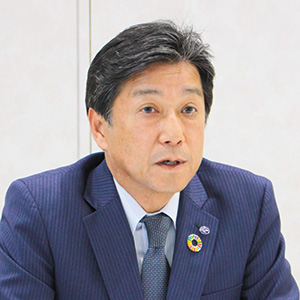
Officer in charge of promoting Sustainability Disclosure Subcommittee Director,
Managing Executive Officer, Executive General Manager, Administration Division
Environmental Committee
The Environmental Committee conducts activities to achieve LSV 2030 based on the LINTEC Green Plan, formulated on the environmental issues of climate change, the circular economy, and co-existence with nature for the development of a sustainability world. Regarding climate change (decarbonization), to help the LINTEC Group achieve the target of cutting CO2 emissions by 50% or more by 2030 (compared to fiscal 2013 levels), it manages the progress of the plan to reduce CO2 emissions in and outside Japan. In fiscal 2022, steady progress was made due to factors such as capital investment made ahead of schedule and the introduction of green electricity.
Regarding the circular economy, the committee disclosed the Targets for Emissions Reduction, Recycling, etc. under the Act on Promotion of Resource Circulation for Plastics at our website in March 2023, thereby promoting reduction of waste plastics, etc.
For co-existence with nature, it is preparing a disclosure proposal based on the TNFD (Taskforce on Nature-related Financial Disclosures) recommendations.
TCFD Subcommittee
In order to disclose information based on the TCFD recommendations, the TCFD Subcommittee expanded the time frame for examination from 2030 (medium-term) to 2050 (long-term) and established the image of society that LINTEC envisions. For domestic business, the subcommittee analyzed the two scenarios of 2°C or below 1.5°C, and 4°C.
Regarding strategy, it examined the “risks and opportunities, and countermeasures” that have a significant impact on business, reevaluated their financial impact and resilience, and renewed the information to be disclosed.
Going forward, it plans to expand the examination coverage to overseas business and delve into estimates of the quantitative impacts.
Comment by the officer in charge
The Environmental Committee, based on the long-term vision LSV 2030, formulated the LINTEC Green Plan aimed at realization of a sustainability world, and manages the progress of the plan for renewing various facilities for carbon free both domestically and internationally compared to fiscal 2013.
In preparation for disclosure of non-financial information toward realizing a carbon free world, the TCFD Subcommittee is advancing discussions toward achieving carbon neutrality by 2050.
To make LINTEC a company that will continue to be needed by society, we are working to improve its business activities through our committee activities by focusing on and examining various elements, with the aim of not only reducing CO2 emissions but helping to realize a sustainability world and creating a vision for our future manufacturing.
In response to the TNFD recommendations for biodiversity, we will deploy initiatives to our production sites in Japan based on the initiatives implemented at the Kumagaya Plant.
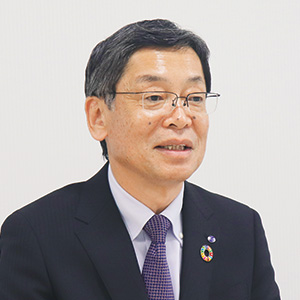
Officer in charge of promoting the Environmental Committee Director, Managing Executive Officer, Executive General Manager, Production Division, and in charge of the Quality Assurance Division and the Environment & Safety Division
Social & Governance Committee
The Social & Governance Committee checks the progress of initiatives related to S (for society) and G (for governance) of ESG on a quarterly basis.
In fiscal 2022, it confirmed the progress of internal briefings and various preparatory operations related to company-wide measures, such as the age 65 retirement system (operation started in April 2023) and the employee survey (introduced in January 2023), while also being committed to important individual themes, such as increasing the percentage of male employees who take childcare leave and checking the FTSE index reviews.
Corporate Ethics Subcommittee
The Corporate Ethics Subcommittee is engaged in activities for fostering, disseminating and establishing business ethics. It provided means for information provision and education on the four themes below.
- Publishing the Rinri Kawaraban (ethics newsletter): A senryu (haiku-like poem) related to the Code of Conduct is posted on the intranet monthly. Published these senryu as a booklet
- Ethics awareness posters: Created and distributed the FY2022 version poster featuring “harassment” as the theme, and posted the FY2021 version on the intranet
- Information security self-audit: Added questions for e-learning
- Corporate ethics lessons learned from the case studies of other companies: Presented cases of “information leakage, unauthorized access, cyber attacks” and “insider trading, false labeling, violations of the Act Against Unjustifiable Premiums and Misleading Representations” with explanations
Social Contribution Subcommittee
The Social Contribution Subcommittee aims to help the LINTEC Group act as a good corporate citizen within its local communities and the global community by promoting realistic activities that will contribute to the sustainable development of society. In fiscal 2022, it held four meetings concurrently with online meetings (in June, September, December 2021, and March 2022) to discuss the content of the activities. Although the professional baseball game outing for people with disabilities and the Fureai Concert in Itabashi Ward, where our Head Office is located, were cancelled again as in the previous year due to the COVID-19 pandemic, the subcommittee considered and conducted other activities, including supporting the Itabashi Ward’s 90th anniversary commemorative events, cooperating with food pantry events to provide food for households in need, and offering fried chicken gift cards at Christmas.
Diversity & Work Style Reform Promotion Subcommittee
The Diversity & Work Style Reform Promotion Subcommittee was established under the Social & Governance Committee on April 1, 2022 to identify internal and external needs related to diversity and work styles, ensure the penetration of related measures and systems, and raise awareness, with the aim of contributing to building a robust corporate structure.
In fiscal 2022, it held a meeting once a month and carried out activities for identifying needs, disseminating systems, and raising awareness in parallel with the Human Resources Department, which develops such systems. Specifically, the subcommittee held discussions on various human resources issues, such as the shift to the age 65 retirement system and measures to increase the percentage of male employees who take childcare leave. In addition, it produced and distributed the Handbook on the Use of Support Systems (Vol. 4) to provide easy-to-understand explanations for various HR systems.
Comment by the officer in charge
Today, companies are required more than ever to serve as a public organ of society. In the aspect of “society,” we are required to create a company that places respect for human rights at the center of its corporate activities, allows all members of the company to play active roles, and contributes to the sustainability of society as a whole. At LINTEC, I think it is necessary to develop a human resources strategy that is linked to the management strategy, and to promote so-called “human capital management.” In terms of “governance,” as the weakening earning power of Japanese companies has been pointed out, it is necessary to enhance management and communication capabilities by employing the opinions of outsiders. I think it is particularly important to continue to implement PDCA through an annual evaluation of the effectiveness of the Board of Directors and to examine corporate governance measures from the perspective of investors. The Social & Governance Committee is committed to discussing measures to achieve these goals and actively promote them through the three relevant subcommittees and departments in charge.
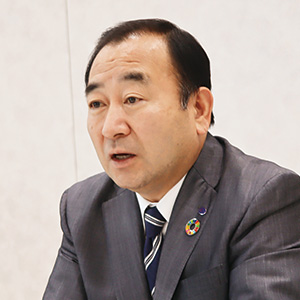
Officer in charge of promoting the Social & Governance Committee
Director, Senior Managing Executive Officer, Executive General Manager, General Affairs & Human Resources Division
SDGs Committee
The SDGs Committee, which started working in July 2021, conducts activities in two groups: one for generating new business ideas and the other for delving into business ideas that were proposed in the past. Despite limitations due to the COVID-19 pandemic, the former held a meeting for proposals in November 2022 and the latter held a report meeting in December to present their proposals to management. Both consulted and collaborated with existing departments responsible for setting up new businesses, through which a work flow was established to expand initiatives with the involvement of many parties.
Comment by the officer in charge
Aiming to contribute to solving various social issues through our mainstay business activities, the committee recruits members from across the company regardless of occupation, age, and gender to address the task of creating new business ideas.
I hope that the members will later communicate the knowledge, experience, examination techniques, etc. that they have obtained through this initiative at their own workplaces. By doing so, it is expected that efforts regarding SDGs will spread throughout the Group not as special actions but as ordinary ones.
Regarding the created business ideas, we hold discussions with the New Project Planning Office and the Next-Generation Technological Innovation Group, and promote their commercialization as products or businesses.
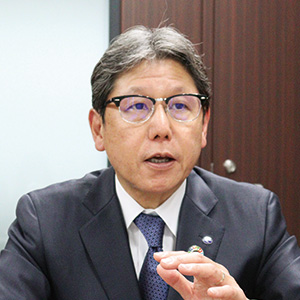
Officer in charge of promoting the SDGs Committee
Director, Senior Managing Executive Officer, Executive General Manager, Business Administration Division
Corporate Risk Management Committee
In fiscal 2022, the Corporate Risk Management Committee held six regular meetings and discussed a contingency involving Taiwan, which was an agenda suggested by committee members, and instructed the relevant departments to make preparations for an emergency. During periodic risk identification, the committee identified risks related to product sales from supervisors in sales and related departments, identified particularly important risks, and implemented necessary response measures, such as enhancing product sales management. The Committee will continue its efforts to grasp changes that may affect the LINTEC Group’s business and enhance the risk management systems.
Comment by the officer in charge
The Corporate Risk Management Committee comprises members who are executive general managers and general managers of offices under the direct control of the president. The committee identifies various business risks in the era of VUCA★, comprehends their actual situation and discusses countermeasures, and provides feedback to business sites after reporting to and obtaining approval from the Sustainability Committee, thereby preventing problems from occurring.
In line with our company accelerating the global expansion of its business, we will continuously identify risks and opportunities while complying with the laws and regulations of relevant countries and understanding differences in business practices and cultures.
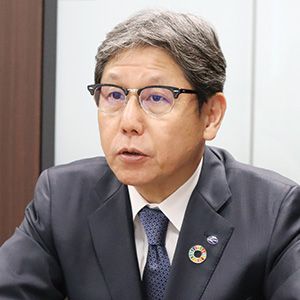
Officer in charge of promoting the Corporate Risk Management Committee
Director, Senior Managing Executive Officer, Executive General Manager, Business Administration Division
- ★VUCA: An acronym for Volatility, Uncertainty, Complexity and Ambiguity, describing the situation and the characteristics of a time in which it is difficult for society and business to predict the future.
Our Network for Promoting Sustainability
All employees of the LINTEC Group, including overseas sites, are committed to contributing to the realization of a sustainability world.
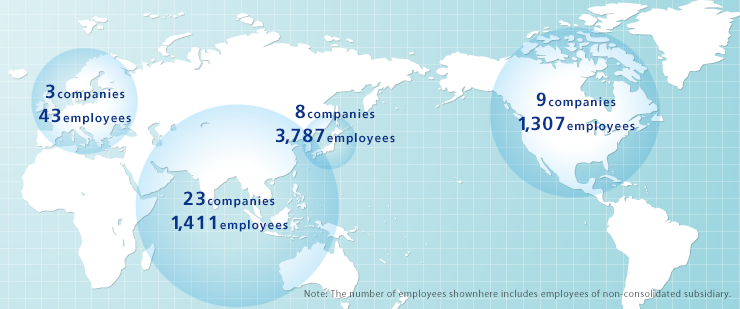
Operation sites
- Note:Go to the About LINTEC page.

